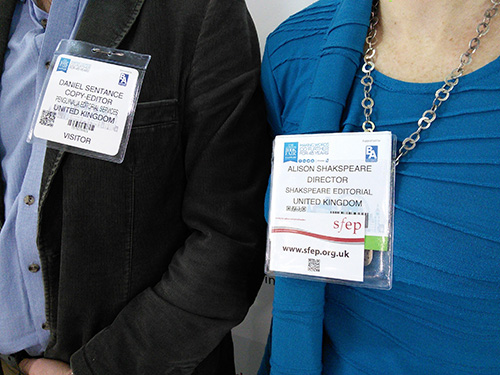As many of you will know (at least avid forum readers), I recently ran an SfEP stand at the London Book Fair, ably assisted by a crack team of volunteer members. Was it worth it? Only time will tell in terms of actual new joiners and new clients using our services, but my overall impression is yes!
New members? New clients?
 Being a publisher-focused event – and more than that, being a very sales-focused event – I feared we might have many visits from people who wanted to sell us their latest gizmo or whizzy program, or indeed bend our ears about their authorial masterpiece. We did get a couple of those visits, but thankfully not too many.
Being a publisher-focused event – and more than that, being a very sales-focused event – I feared we might have many visits from people who wanted to sell us their latest gizmo or whizzy program, or indeed bend our ears about their authorial masterpiece. We did get a couple of those visits, but thankfully not too many.
I was pleasantly surprised to find that most of our conversations were meaningful and productive. I was particularly pleased that we had a pretty even mix of visitors: people working as editors or proofreaders (or wanting to) who were looking for support, and also publishers and authors looking for good professional help. There is a need for us!
The in-person contact gave us the chance to talk through people’s questions about joining, upgrading and training, as well as show off the benefits of membership, including participation in the forums and local groups, and these were met with enthusiasm. Look out for potential new joiners visiting your local group to ‘try before they buy’!
Publishers and authors, as potential clients, were very pleased to hear of our directory and we showed lots of people how to use it. Many expressed appreciation of the fact that everyone in our directory has had to show certain levels of competence and experience to attain their grade of membership, which goes to show that it’s well worth upgrading as soon as you can. Clients are desperate to find a reliable source of good editors and proofreaders in the murky sea of internet listings.
So that’s what editors do
Of course, we had many interesting discussions on the value of proofreading and editing and how the process works. One self-publishing author asked whether it was really worth having his book edited as he’s already listed it on Amazon and it is selling. He went on to answer his own question by revealing that the reviews he has received so far are all along the lines of ‘Good book. Shame about the typos’.
It was enlightening for him to hear about what we editors actually do. When I mentioned that a lot of the job is about consistency checks his response went something like this: ‘Oh, so you take care of all of that? Wow! I could have done with that service for my last book.’ I asked him why. He explained that a friend had read his book and really liked it, then asked: ‘But what happened to the body in the park?’ One for the good fiction editor’s checklist, I think!
That can’t be Margaret!
The Fair was also an opportunity to get to know some other SfEP members better, and I was able to share information about SfEP that some didn’t know. As well as those who helped to run the stand, other members popped by to say hello. At one point we had two very aptly named editors on hand.
It was great to hear about what other editors and proofreaders do in their businesses and to share their stories, instructive as well as funny. And you learn the most interesting things when you speak to editorial professionals. For example, I found out that there is a ‘German way’ of knitting that’s visibly noticeable to those in the know. That’s the sort of ‘useful fact’ that comes out in group and forum discussions that editors can tuck away in the hope that one day it will come in handy.
Meeting in person those so far encountered only virtually can, however, be a revelation. When I was deep in conversation with a stand visitor I was pointed out to one of our number. ‘But that can’t be Margaret!’ came the response. ‘I thought she was tall!’ [I’m not – you know who you are ;-)]
But what about the pigeon, I hear you ask. Well, I think she just came for the biscuits.
 Many thanks to our lovely members who gave time and enthusiasm to help run the stand: Josephine Bacon, Alex Boon, Piers Cardon, John Firth, Jane Hammett, Anya Hastwell, Mary Hobbins, Richard Hutchinson, Liz Jones, Jackie Mace, Rene Nel, Peter Norrington, Alison Shakspeare, Richard Sheehan, Wendy Toole, Jeremy Toynbee, Alison Walters.
Many thanks to our lovely members who gave time and enthusiasm to help run the stand: Josephine Bacon, Alex Boon, Piers Cardon, John Firth, Jane Hammett, Anya Hastwell, Mary Hobbins, Richard Hutchinson, Liz Jones, Jackie Mace, Rene Nel, Peter Norrington, Alison Shakspeare, Richard Sheehan, Wendy Toole, Jeremy Toynbee, Alison Walters.
 Margaret Hunter is a freelance copy-editor, proofreader and formatter and is the SfEP’s marketing and PR director.
Margaret Hunter is a freelance copy-editor, proofreader and formatter and is the SfEP’s marketing and PR director.
daisyeditorial.co.uk | facebook.com/daisyeditorial | @daisyeditorial
sfep.org.uk/directory/daisy-editorial
Posted by Tracey Roberts, SfEP blog coordinator.
The views expressed here do not necessarily reflect those of the SfEP



